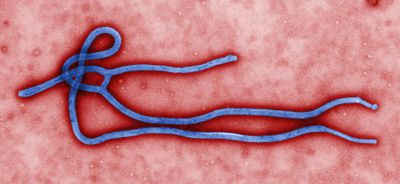Ebola Transmission: Difference between revisions
Vgawlik6782 (talk | contribs) No edit summary |
Vgawlik6782 (talk | contribs) No edit summary |
||
| Line 3: | Line 3: | ||
The Ebola virus is a severe | The Ebola virus is a severe disease-causing pathogen that poses a huge threat to human health mostly within central Africa. Ebola is considered a Biosafety level 4 (BSL-4) agent; classifying it among the most threatening agents that exist in the world today. Agents within this category pose severe threats to human health and can be fatal due to the lack of treatments and/or available vaccines. There are five known Ebola species within the family <i>Filoviridae</i> and all of the species within the family cause varying degrees of viral hemorrhagic fever illnesses. | ||
Revision as of 02:10, 26 March 2013
Introduction
The Ebola virus is a severe disease-causing pathogen that poses a huge threat to human health mostly within central Africa. Ebola is considered a Biosafety level 4 (BSL-4) agent; classifying it among the most threatening agents that exist in the world today. Agents within this category pose severe threats to human health and can be fatal due to the lack of treatments and/or available vaccines. There are five known Ebola species within the family Filoviridae and all of the species within the family cause varying degrees of viral hemorrhagic fever illnesses.
Ebola Virus Structure
Include some current research in each topic, with at least one figure showing data.
Ebola Transmission
Include some current research in each topic, with at least one figure showing data.
Ebola Treatments
Include some current research in each topic, with at least one figure showing data.
Conclusion
Overall paper length should be 3,000 words, with at least 3 figures.
References
Edited by (Victoria Rose Gawlik), a student of Nora Sullivan in BIOL187S (Microbial Life) in The Keck Science Department of the Claremont Colleges Spring 2013.



